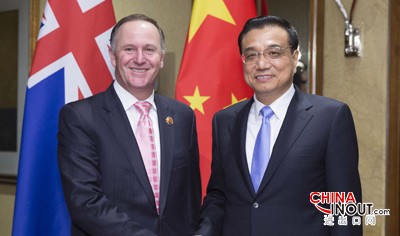中国总理李克强周日呼吁东亚国家建立更紧密的经济关系,促进政治互信,确保在全球经济放缓的背景下东亚地区经济稳步发展。
李克强在第十届东亚峰会上表示,东亚地区的经济一体化成果来之不易,理应珍惜,为世界和平、稳定和发展做出更大的贡献。
他建议与会国家坚持东亚峰会“领导人引领的战略论坛”性质,坚持东盟的核心作用,坚持经济发展和政治安全“双轮驱动”,坚持促进不同机制的协调发展。
针对东亚峰会的未来发展,李克强提出了三方面的建议。其中,他首先强调要加快区域经济一体化,让东亚成为世界经济的一个稳定增长点。
作为亚洲首个次区域共同体,东盟共同体有望在本年底建成。中国表示东盟共同体的建成是“区域一体化建设的里程碑”。
李克强称,中国愿与其他东盟国家增强发展战略间的相互协调,实现在2020年建成东亚经济体的构想。
他还呼吁东亚金融机构成立协会,促进相互合作。
同时,李克强倡议各国积极展开政治和安全对话,建立适合东亚地区的安全架构。
他表示:“各方应该增强发展战略和政策的沟通协调,促进政治互信。”
李克强建议东亚国家加强对话交流,推动不同文明的和谐共存。
他表示,东亚国家应该深化教育、科技、文化、媒体、智库机构以及年轻人之间的交流合作。
在中国南海问题上,李克强提出了五点建议,支持促进争议水域的和平稳定,他要求域外国家避免采取可能导致紧张局势的行动。
峰会上,其他领导人也一致认为东亚峰会应在深化区域政治互信、加强区域经济联系方面发挥更大的作用。
领导人还达成共识,在符合国际法的情况下,通过谈判和建设性方式和平解决分歧。
他们相信,认真实施《南海各方行为宣言》,推进关于各方行为准则的谈判,是相关国家的共同意愿。(中国进出口网)
Chinese Premier Li Keqiangon Sunday called on East Asian nations to forge closer economic ties and promote political trust to ensure stable growth in the region amid global economic slowdown.
Speaking at the 10th East Asia Summit (EAS), Li said the economically integrating region should treasure the hard-earned desirable situation to further contribute to world peace, stability and growth.
He suggested that the participants stick to the EAS' nature of a "leaders-led strategic forum," to ASEAN's central role, to advancing on the two wheels of economic development and political security, and to promoting coordinated development of different mechanisms.

In a three-pronged proposal for future East Asian summitry, Li first called for faster regional economic integration so as to make East Asia a stable growth pole for the world economy.
The ASEAN Community, the first sub-regional community in Asia, is expected to take shape by the end of this year. Beijing has described the development as "a milestone in regional integration."
China, Li said, is willing to enhance the dovetailing of its development strategy with those of ASEAN in order to realize the vision of forging an East Asian economic community by 2020.
He also called on financial institutions in the region to form an association to facilitate cooperation.
Meanwhile, the Chinese premier called for active political and security dialogue and the establishment of a security architecture suitable for the region.
"All parties should strengthen communication and coordination on their respective development strategies and policies so as to promote political trust," Li said.
Also, the premier proposed that nations in the region enhance dialogue and exchanges to promote harmonious coexistence of different civilizations.
Countries in the region should deepen communication and cooperation in areas of education, science and technology, culture, media, think tanks and youth, he said.
As regards the South China Sea disputes, Li put forth a five-point proposal to uphold and promote peace and stability in the busy body of water, and called on countries outside the region to refrain from taking actions that may cause tension.
Other leaders at the summit agreed that the EAS should play a bigger role in deepening political trust and economic relations throughout the region.
They also reached consensus on peacefully addressing differences through negotiation and constructive means and in line with international law.
They expressed their belief that related countries share the will to earnestly implement the Declaration on the Conduct of Parties in the South China Sea and advance the negotiation on a code of conduct.











